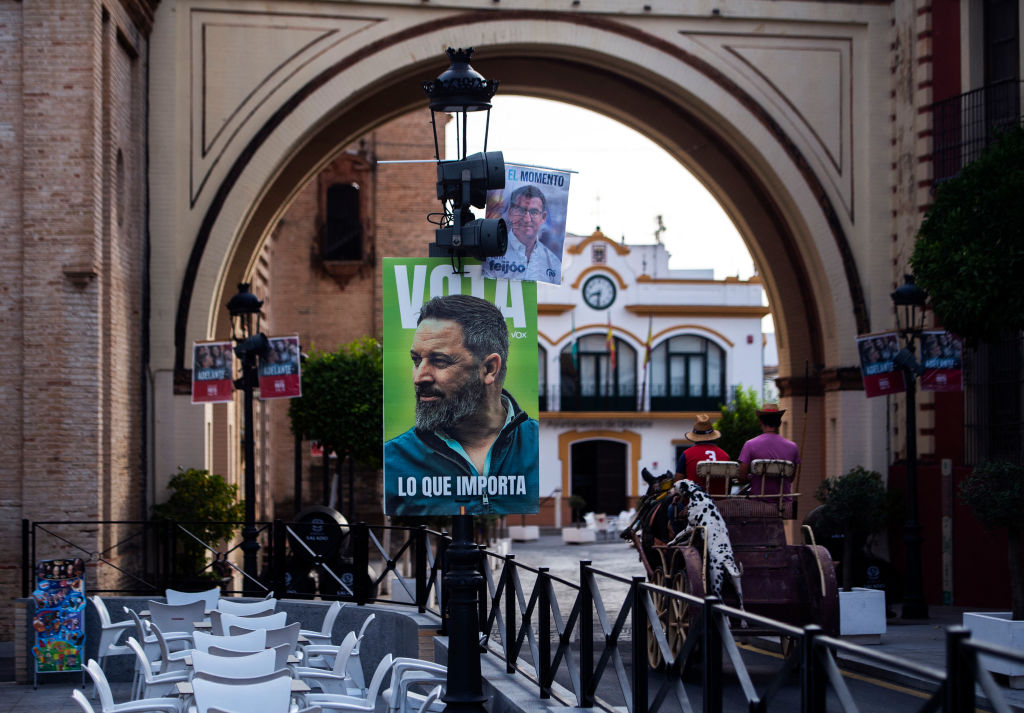If Spain’s left-wing government loses tomorrow’s general election, thousands of people including many senior civil servants stand to lose their jobs. Their positions are discretionary; if the political masters change, so do the personnel.
When the left took office in 2018, for example, an estimated 6,000 public servants were fired, including several hundred advisers. The incoming Prime Minister Pedro Sánchez also put trusted supporters in charge of the state-run broadcasting company, the Paradors (a chain of state-owned hotels) and the social research organisation that organises opinion polls. Not surprisingly, its polls have been biased to the left ever since.
Both right and left suggest that their opponents are not merely wrong but illegitimate, beyond the democratic pale
This ‘jobs for the boys’ approach is even worse inside the political parties. Across the spectrum, Spanish parties are highly disciplined, top-down organisations; intolerant of dissent, the party leaders fill posts with ‘yes men’. It’s a system that fosters unquestioning obedience, groupthink and dogmatism.
It’s no surprise, then, that there is also little tolerance for the ideas of other parties. Instead, debate is littered with put-downs and name-calling. William Chislett of the Elcano Royal Institute, an international affairs think-tank in Madrid, describes the prevailing culture as ‘particularly toxic… especially the political bellowing about ‘reds’ and ‘fascists’, reviving the language of the 1936-39 Civil War’.
In televised discussions two or three rival pundits often talk over each other. Listening carefully to an opposing opinion is regarded as a sign of weakness – an indication that it might be right. Ensuring your opponents can’t be heard turns out to be a simple and effective form of censorship.
So is suggesting that they have no place in a democracy. In this campaign the right has constantly demonised the left-wing coalition for relying on the votes of democratically elected Basque and Catalan separatists – ‘the enemies of Spain’. Meanwhile the left has repeated ad nauseam the mantra that Vox is a party of ‘far-right fascists’. And since the Partido Popular, the other party on the right, has joined forces with Vox to govern town halls and regions, that makes it an enabler of fascism – which of course is tantamount to being fascist. Both right and left, then, suggest that their opponents are not merely wrong but illegitimate, beyond the democratic pale.
It was very different 45 years ago. Emerging from Franco’s dictatorship, political parties buried their differences to further a unifying national project – joining the family of rich western democracies from which Spain had been isolated for so long. But now, with that mission long since accomplished, old enmities have emerged with a vengeance.
The problem has worsened considerably over recent years with the decline and subsequent demise of the centrist party Ciudadanos. While Ciudadanos was still around, both PSOE, the main left-wing party, and the Partido Popular, the main right-wing party, saw it as a potential coalition partner. But now PSOE has had to move further left to facilitate its agreements with the Sumar party, while the Partido Popular has shifted further to the right to accommodate its only potential ally – Vox.
Spain then has divided into two highly polarised camps that have very little common ground and, according to the polls, are approximately equal in size. A YouGov poll on Monday, the last day on which polls were permitted, suggested a knife-edge result in which the right-wing might just scrape home. Meanwhile, the state-run social research organisation was, predictably, suggesting victory for the left. One thing is certain: whoever loses will be extremely bitter.
But however acrimonious things are about to get, there is no prospect of another civil war. The dictator Franco, nearing the end of his life, predicted what would happen after his death: ‘Spain will go a long way down the road that [the West] wants: democracy, pornography, drugs and so on. There will be a lot of crazy things but nothing terminal.’
Pressed on how he could be so sure, he replied, ‘Because I’m leaving something that I didn’t find on taking over the government of this country 40 years ago: the Spanish middle class… There won’t be another civil war.’
Although the quality of Spanish politicians may not have improved much since the 1930s, social circumstances have. Ninety years ago abject poverty meant that millions had nothing to lose. Spanish people are no longer so radicalised. Unfortunately their politicians are.






Comments